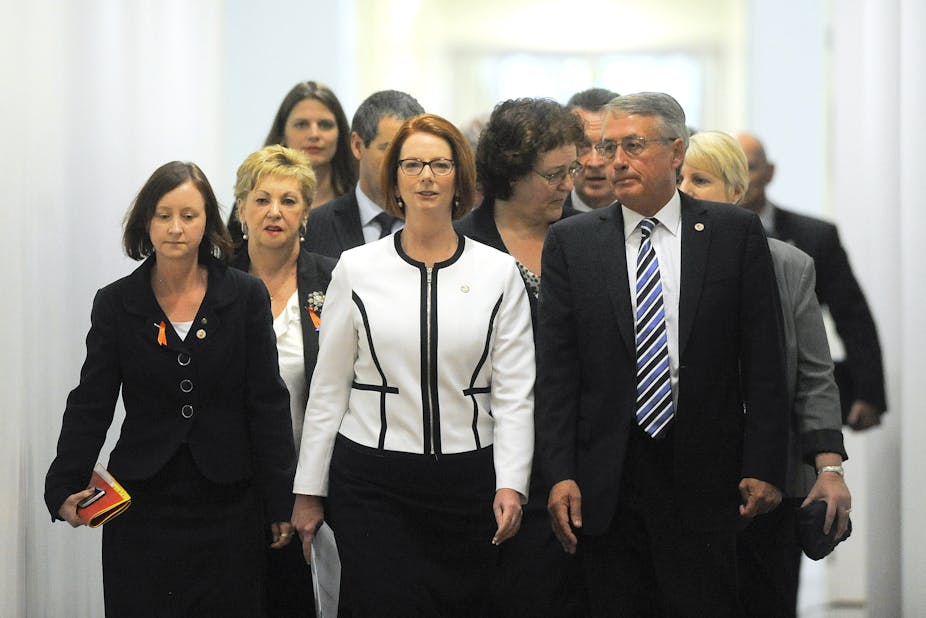In a scene in the famous 90s sitcom Seinfeld, George describes to Jerry an idea for a show about nothing. After the events of the last days and weeks in federal and state politics, we can ask whether Australian politics has become a Seinfeld moment.
In Australia the nothingness of internal party politics reveals something very real.
Leadership challenges and changes of leadership have become more frequent in Australian politics than ever before. As traditional partisan division between and within parties have declined politicians have pursued power all the more aggressively as an end in itself.
The irresolvable viciousness of internal conflict within political parties reflects not policy divergence but convergence.
Political parties have had to manage this new reality. Here they face two distinct challenges: there is the imperative to change leaders for electoral purposes and the fear that “disunity is death”.
As we saw yesterday even the hint of leadership conflict generates media frenzy. The result is that parties have developed the strategy of the uncontested transition. Former leaders now participate in a ritual reminiscent of George Orwell’s Nineteen Eighty-Four, where their record in power is mysteriously erased.
Political players live in an eternal present. Decisions about the fates of leaders are no longer made in the party room but beforehand. Neither Kevin Rudd nor Ted Baillieu contested their removal.
Kevin Rudd has refused to even contest the leadership and will only settle for unanimous support. The fear of contestation is a broader pattern across the political landscape. Every party conference is more stage managed than the last.

Yet the decline of intra-party conflict leaves voters cold. It is a sign of the decay of policy contestation within political parties. This decay has left a vacuum filled by unresolvable debates about electability, a poll can always been found or an argument made to bolster the claim of one politician over another.
An economy in upheaval and a more volatile electorate also has the consequence that polls fluctuate more and there are many more polls to pick and choose from. After 1975 Gough Whitlam anticipated a future of permanent instability in federal politics. He argued that governments that lacked a Senate majority would be forced to the polls whenever advantageous for the opposition. This did not occur but we have arrived at surprisingly similar political outcome except that leaders are overthrown not by their political opponents but by their supporters.
Arguments about policy can be resolved. They are either adopted or not. Paul Keating’s challenge to Bob Hawke provides an example. The former Treasurer criticised key policies of the Hawke government: Medicare co-payments, Hawke’s new federalism and the cautious response of the government to the recession.
Many of Hawke’s supporters, perhaps with some validity, argued that Keating’s concern with these politics was opportunistic, but Keating provided caucus with a choice. Keating also persuaded caucus that he could take the fight to John Hewson’s coalition, even although Hawke remained more popular in opinion polls. Over a decade later Peter Costello had a similar choice to Keating but instead waited in vain for John Howard to move on.
The Hawke/Keating battle was bitter. Hawke’s supporters accused Keating of having placed his own interests ahead of the government in much the same manner as Gillard loyalists criticise Rudd. Yet the Keating government was remarkably harmonious. Keating relied heavily on ministers who had been Hawke loyalists. Labor had resolved an argument about policy and moved on.
Rudd’s failure to challenge Gillard and his pursuit of the dream of a coronation by Labor is consistent with his failure to raise one substantive area of policy divergence from Gillard.

On issues such as the mining tax and single parent payments Labor has accepted a conservative agenda. Rudd shows no sign of differentiation from this agenda. A similar pattern has also occurred at times within the conservative parties. In 1971 Liberal Prime Minister John Gorton and his rival William McMahon tied in a leadership ballot.
On a day as chaotic as that of Thursday Gorton resigned the Prime Ministership and then successfully contested the ballot for the deputy leadership. This shambolic exercise spoke to the ideological exhaustion of the post-Menzies Liberal Party; it was Whitlam’s Labor party that set the national policy agenda.
Ted Baillieu’s resignation demonstrated that the Victorian Coalition had failed to develop an agenda distinctive from that of Labor. The new Premier’s major priority is to neutralise issues such as TAFE funding and teacher pay where Labor has set the agenda.
The dysfunction of federal Labor and of the Victorian Liberals arises from a similar cause; both are governments that find the political agenda set by their opponents. The euphoria of 2007 when Rudd vanquished Howard is now a dream, whilst the Victorian Liberals have to govern an urban and multicultural state inhospitable to conservative politics.
The result for both parties is a pattern frustration and self-destruction manifest in irresolvable leadership conflicts, even although the individuals in these battles can never explain why they are fighting.

